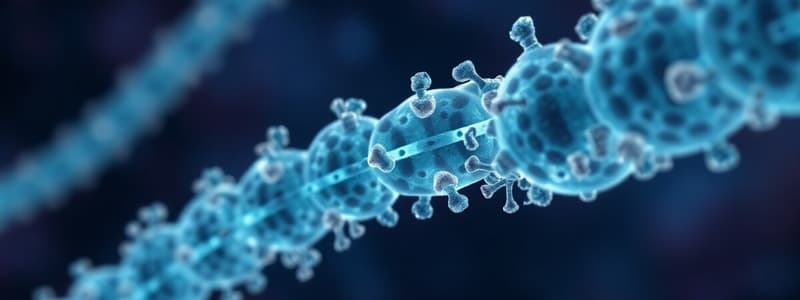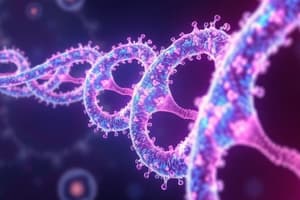Podcast
Questions and Answers
Which cancers are commonly associated with TERT promoter mutations?
Which cancers are commonly associated with TERT promoter mutations?
- Colon cancer
- Breast cancer
- Glioblastoma (correct)
- Merkel cell carcinoma
Higher levels of TERT expression are associated with better survival rates in bladder carcinoma patients.
Higher levels of TERT expression are associated with better survival rates in bladder carcinoma patients.
False (B)
Name one consequence of having too much telomerase activity.
Name one consequence of having too much telomerase activity.
Cancer
A correlation between telomerase over expression and __________ exists in human cancer.
A correlation between telomerase over expression and __________ exists in human cancer.
Match the following cancers with their association with TERT mutations:
Match the following cancers with their association with TERT mutations:
What is the first step towards carcinogenesis in cells?
What is the first step towards carcinogenesis in cells?
Transformed cells are dependent on serum for growth.
Transformed cells are dependent on serum for growth.
What process occurs when telomeres become too short?
What process occurs when telomeres become too short?
The protective ends of linear chromosomes are called __________.
The protective ends of linear chromosomes are called __________.
During which phase do the majority of primary cells die?
During which phase do the majority of primary cells die?
Match the following terms with their descriptions:
Match the following terms with their descriptions:
What characterizes transformed cells?
What characterizes transformed cells?
Immortalized cells are equivalent to malignant cells in vivo.
Immortalized cells are equivalent to malignant cells in vivo.
What role does telomerase play in cells that require extensive proliferation?
What role does telomerase play in cells that require extensive proliferation?
The short single-stranded DNA at the telomere does not play any role in protecting chromosome ends.
The short single-stranded DNA at the telomere does not play any role in protecting chromosome ends.
What happens to chromosomes when telomere loss occurs?
What happens to chromosomes when telomere loss occurs?
Telomerase is a reverse transcriptase known as _____.
Telomerase is a reverse transcriptase known as _____.
What is the main consequence of telomerase loss of function?
What is the main consequence of telomerase loss of function?
Telomerase is expressed at low levels in invasive cancers.
Telomerase is expressed at low levels in invasive cancers.
What is the effect of high telomerase activity in cancer cells?
What is the effect of high telomerase activity in cancer cells?
Dyskeratosis congenita is caused by a mutation in one _____ allele.
Dyskeratosis congenita is caused by a mutation in one _____ allele.
Which protein is linked to increased telomerase activity through an oncogenic effect?
Which protein is linked to increased telomerase activity through an oncogenic effect?
Long telomeres have fewer binding proteins, allowing stronger inhibition of telomerase.
Long telomeres have fewer binding proteins, allowing stronger inhibition of telomerase.
What is the primary function of TERT?
What is the primary function of TERT?
Shortened telomeres can lead to increased _____ risk.
Shortened telomeres can lead to increased _____ risk.
The creation of a protective t-loop involves the binding of single-stranded DNA to what type of region?
The creation of a protective t-loop involves the binding of single-stranded DNA to what type of region?
Flashcards
TERT Promoter Mutations
TERT Promoter Mutations
These mutations in the TERT promoter region are frequently found in melanoma and other cancers, but not in normal cells. They contribute to cancer development.
Telomerase Overexpression and Cancer
Telomerase Overexpression and Cancer
A strong correlation exists between increased levels of telomerase activity (overexpression) and the development of several types of cancer.
TERT Promoter Mutations: Not Universal
TERT Promoter Mutations: Not Universal
While TERT promoter mutations are common in some cancers like melanoma, they are not found in all cancers. For example, they are rarely seen in colon or breast cancer.
TERT Expression and Survival
TERT Expression and Survival
Signup and view all the flashcards
Telomerase Balance
Telomerase Balance
Signup and view all the flashcards
Cancer Cell Immortality
Cancer Cell Immortality
Signup and view all the flashcards
Primary Cells
Primary Cells
Signup and view all the flashcards
Crisis (Cancer)
Crisis (Cancer)
Signup and view all the flashcards
Immortalization
Immortalization
Signup and view all the flashcards
Transformation (Cancer)
Transformation (Cancer)
Signup and view all the flashcards
Metastases
Metastases
Signup and view all the flashcards
Telomeres
Telomeres
Signup and view all the flashcards
Telomerase
Telomerase
Signup and view all the flashcards
Telomere Loss
Telomere Loss
Signup and view all the flashcards
Reverse Transcriptase
Reverse Transcriptase
Signup and view all the flashcards
Telomere-Binding Proteins
Telomere-Binding Proteins
Signup and view all the flashcards
T-loop
T-loop
Signup and view all the flashcards
Dyskeratosis Congenita
Dyskeratosis Congenita
Signup and view all the flashcards
Telomerase Gain of Function (GOF)
Telomerase Gain of Function (GOF)
Signup and view all the flashcards
Telomerase in Cancer Cells
Telomerase in Cancer Cells
Signup and view all the flashcards
TERT (Telomerase Reverse Transcriptase)
TERT (Telomerase Reverse Transcriptase)
Signup and view all the flashcards
Epigenetic Switch
Epigenetic Switch
Signup and view all the flashcards
Myc TF
Myc TF
Signup and view all the flashcards
Undifferentiated Stem-Like Phenotype
Undifferentiated Stem-Like Phenotype
Signup and view all the flashcards
Telomere Length Regulation
Telomere Length Regulation
Signup and view all the flashcards
Telomerase Loss of Function (LOF)
Telomerase Loss of Function (LOF)
Signup and view all the flashcards
Study Notes
Cancer Replication and Telomeres
- Cancer cells replicate immortally, a crucial characteristic.
- Experimental cancer progression in cell culture demonstrates sequential stages: primary cells, crisis, immortalization, transformation, and metastasis.
- Primary cells have limited divisions; crisis marks cell death; immortalized cells continue dividing but remain attached to the plate and require serum; transformed cells grow without contact inhibition or serum; metastasized cells migrate to form new colonies.
Telomeres and Telomerase
- Telomeres are protective caps on chromosome ends, crucial for replication regulation.
- Telomeres shorten progressively (~150-200 base pairs per division) due to limitations of DNA polymerase.
- Shortened telomeres lead to senescence (stopping division) or apoptosis (cell death).
- Telomerase, active in rapidly dividing cells, adds six-base repetitive sequences (TTAGGG) to restore telomere length.
Telomerase Mechanism
- Telomerase, a reverse transcriptase (TERT), uses an RNA template to extend telomeric DNA.
- Telomere-binding proteins regulate telomerase activity; their presence depends on telomere length.
- Short telomeres have weak inhibition of telomerase; long telomeres have strong inhibition.
- This delicate balance maintains telomere length.
- Telomere-binding proteins, along with single-stranded DNA, form a protective t-loop, preventing chromosome damage.
Telomerase and Cancer
- Telomerase is highly expressed (80-90%) in invasive cancers.
- Telomerase knock-out inhibits cancer cell growth and reduces metastasis.
- Myc, an oncogene, upregulates telomerase.
- High telomerase levels promote undifferentiated, stem-like cancer cell traits.
TERT as an Oncogene
- TERT, a subunit of telomerase, can function as an oncogene through promoter mutations (e.g., -124 position).
- These mutations increase TERT expression and telomerase activity.
- This is common in some cancers, like melanoma but not all.
Telomerase and Disease
- Insufficient telomerase activity is linked to reduced stem cell numbers, weakened immunity, premature aging, and increased cancer risk.
- Excessive telomerase activity is directly implicated in cancer development.
- Lower TERT expression correlates with better disease-specific survival in some cancers, such as bladder carcinoma.
Studying That Suits You
Use AI to generate personalized quizzes and flashcards to suit your learning preferences.




